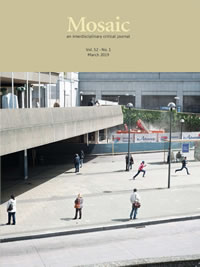Issue 52.1
Overview

General Issue
Published: March 2019
View the issue introduction or see the issue summary and contents below.
10 essays, totalling 192 pages
$24.95 CAD
This issue includes essays on a variety of topics, including gothic tropics in Grace Metalious’s Peyton Place, Barthes as phenomenologist, animal ventriloquism in J.M. Coetzee’s Disgrace, and situational irony. The cover features the work of Dutch artist Esther Hovers.
From Peyton Plantation to Peyton Place: Gothic Tropes in Grace Metalious’s Infamous New England NovelMelanie R. Anderson In 1956, Grace Metalious’s dark representation of New England in Peyton Place irritated critics. This essay examines her use of regional stereotypes and gothic touches, particularly in the background story of the runaway slave Samuel Peyton, his southern past, his haunted castle, and how he became the origin of the town. | |
Barthes the Phenomenologist and the Being of LiteratureNicholas O. Pagan This essay explores Roland Barthes’s recourse to phenomenology, especially in relation to the phenomenology of Husserl and Sartre. Unearthing parallels between Barthes on the eidos of photography and Barthes on literature, the essay argues that in late Barthes, "the being of literature" becomes increasingly detached from language. | |
Group Psychology and Crowd Behaviour in Ira Levin’s The Stepford WivesAfra Alshiban This essay argues that in Ira Levin’s The Stepford Wives, a collectivist-oriented society is created through deindividuation, obedience, compliance, and conformity to group norms. A malevolent leader clouds Stepford men’s thinking and cultivates the perception that women are less than human, making them appear as an enemy deserving of annihilation. | |
No Guts, No Glory: Non-Normative Sexuality and Affect in Chuck Palahniuk’s "Guts"Anna Kozak Chuck Palahniuk’s short story "Guts" is a work of transgressive fiction that exists at the intersections between literature, affect, and queer theory. This essay examines how the affects of shame and disgust function in relation to masculinity and, specifically, the highly policed and stigmatized non-normative sexuality of male youth. | |
The Life in Death of PsychoanalysisStephen Dougherty This essay examines how philosopher Catherine Malabou’s concept of destructive plasticity impacts the situation of contemporary psychoanalytic theory. My argument is that Malabou envisions the life in death of psychoanalysis in its relation to neuroscience, where psychoanalysis’s new beginnings are won at the price of its near total doctrinal destruction. | |
Violence and Ventriloquism in J. M. Coetzee’s DisgraceSonia Li While many critics have read J.M. Coetzee’s Disgrace as a redemptive narrative in which the protagonist undergoes an ethical Bildung through his contact with animals, this essay examines ways in which any possible moral development is dependent on narrative and embodied violence toward human and nonhuman others. | |
Care and Autonomy in The Awakening and Seo’s "Though Time Goes By"Amy C. Smith and Julie Wilhelm Using care ethics and narrative ethics, we analyse Kate Chopin’s The Awakening and Seo Hajin’s “Though Time Goes By” with a focus on struggles to conceive of care as a moral value and to develop relational autonomy. These stories suggest that rewriting identity in the face of repressive narratives requires narrative communities. | |
"A Suspended State": The Body of an American as Cinematic DoppelgängerEdward Eason John Dos Passos uses the montage technique of the cinematic doppelgänger as the means to replot his experience of WWI outside the linear logic of wartime laws and propaganda. Alternatively, he plots wartime’s continuity by dissolving its presence—embodied by the Unknown Soldier—into the lives of survivors. | |
Agamben’s Happy Life: Toward an Ethics of Impotence and Mere CommunicabilitySimon Marijsse Focusing on Giorgio Agamben’s reflections on language and potentiality, this essay examines how a different kind of happiness can enable ethics to venture above the figure of the law, that is, to become an ethics for which living itself is at stake. | |
A Theory of Irony as EventJohn Richardson Scholars from different disciplines have focused on articulated ironies rather than situational ironies. The latter should be understood as events. Their pattern of reversing a forecast is also present in articulated ironies. Understanding this helps elucidate the nature, motivation, and meaning of articulated ironies, and illuminates complex ironic texts. |